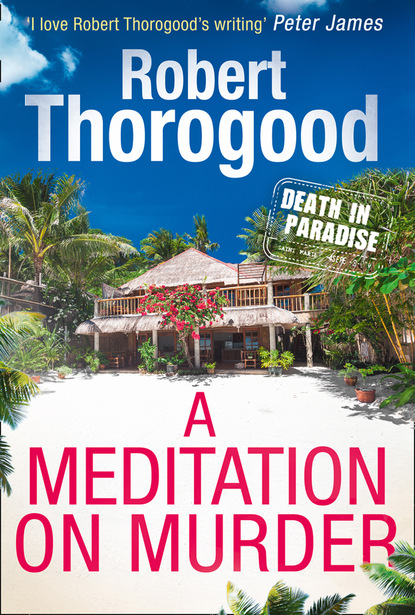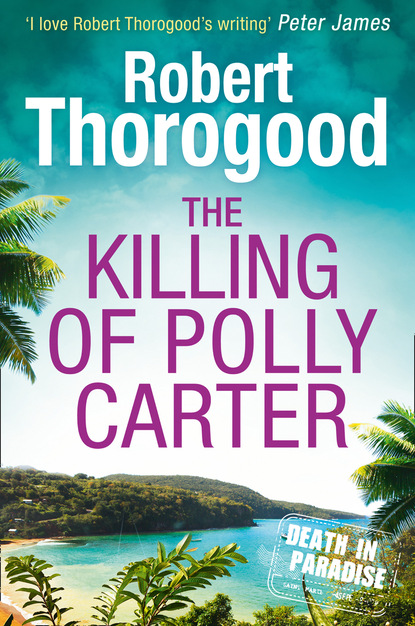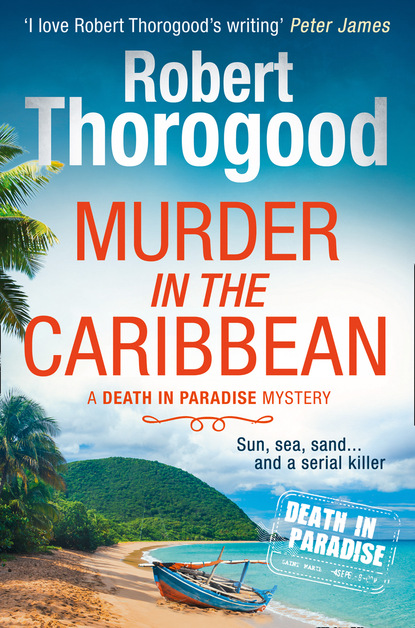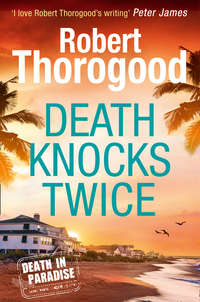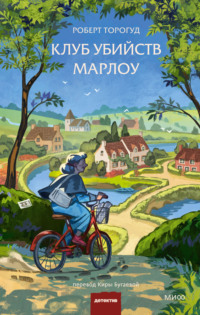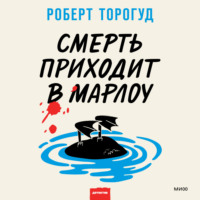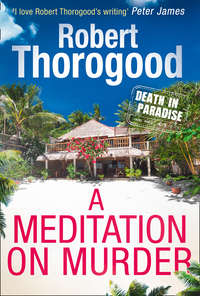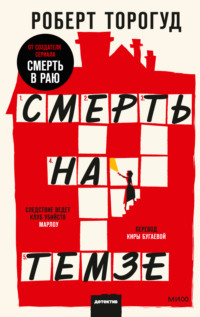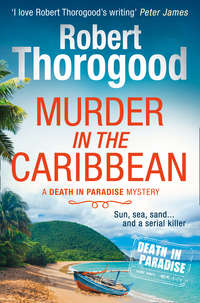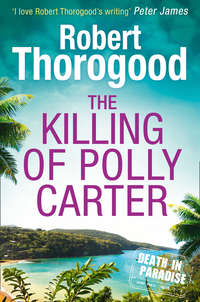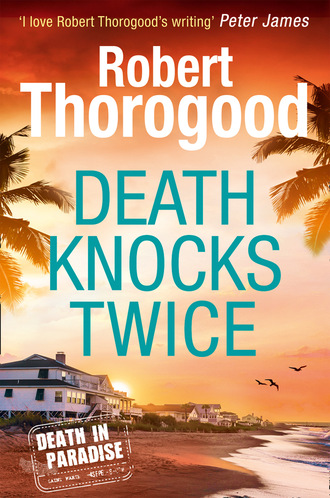
Полная версия
A Death in Paradise Mystery
‘Sir. I’ve brought the occupants of the house to identify the body.’
Richard could see a clutch of people waiting behind Camille. ‘How many people are there?’
‘Three, sir. But a fourth is on the way. He was out in the coffee fields.’
Richard tried to work out the best way of proceeding.
‘Okay, then would you send them in one by one please.’
The first person to enter was tall, thin, had a glossy mane of blonde hair, and was wearing a faded pair of blue jeans, a long-sleeved shirt in blue denim, and very old Converse trainers. Richard guessed that the man was about fifty years old, and from the way that he was carrying himself – and the patrician way he swept his eyes over the scene and the dead body – Richard guessed that this was maybe the plantation owner.
‘Hugh Beaumont,’ the man said with a smile as he went over to Richard and shook his hand firmly. ‘I’m Lucy’s father. I’m in charge here.’
‘Detective Inspector Richard Poole,’ Richard said, quietly impressed by Hugh’s bearing. After all, it took a certain type of person to make sure that introductions were completed satisfactorily while a dead body lay only a few feet away.
‘So, this is Lucy’s Peeping Tom, is it?’ Hugh said, turning to look at the victim.
‘Apparently so,’ Richard said.
‘Amazing. We all thought she was making it up.’
‘You did?’
‘Well, only in the sense that none of the rest of us saw anyone lurking down here. Anyway, I’m sure you’ll have plenty of questions in due course, but let me see if I recognise him.’
Hugh took out a pair of gold-rimmed glasses from his shirt pocket and put them on. He then walked a couple of paces to the side so he could better see the dead man’s face. He bent over to get a closer look, shook his head sadly to himself, and then stood up again.
‘I’m sorry. I’ve no idea who he is.’
‘You don’t?’
‘I’ve never seen that man before in my life.’
‘I see. And you’re sure?’
‘Quite sure.’
‘Might he perhaps be a plantation worker who used to work here?’
‘I don’t think so. I don’t recognise him. And I’m pretty sure I would. I’ve got a good memory for faces. Sorry not to be more help. Shall I send the next person in?’
‘Yes please. Thank you, Mr Beaumont.’
‘Please,’ Hugh said with an easy smile. ‘It’s Hugh.’ He then left, saying, ‘I’ll send Sylvie in next. She’s my wife.’
A few moments after Hugh left, a woman – also in her fifties – entered. And whereas Hugh was tall and thin, Sylvie was far shorter, far rounder, and she was wearing a dark blue trouser suit that wouldn’t have been out of place at a cocktail party at Government House. Richard had the suspicion that Sylvie had put it on specially to meet the Police.
‘So this is the man who’s shot himself?’ she said in plummy tones that were ninety-five per cent regal, Richard realised, and five per cent… what? He wasn’t sure. But there was maybe something forced about just how posh Sylvie was being.
‘How macabre,’ she said, pronouncing ‘macabre’ with a suitably French roll to her tongue. ‘I mean, it’s ghastly, isn’t it? Finding a dead man in one’s shower room. Although, I suppose you’re used to this sort of thing.’
Richard recognised a put-down when he heard one, and decided that he didn’t much like Sylvie.
For her part, Sylvie turned from the body and looked at Richard.
‘You’re that British policeman, aren’t you?’
‘If you mean, am I Detective Inspector Richard Poole, then yes I am. Could you tell me if you recognise the body?’
‘I’m so sorry, but I don’t,’ she said without a hint of regret.
‘Are you sure?’
‘I’m not the sort of person who consorts with tramps.’
‘So that’s who you think this person is? A tramp?’
‘Or vagabond. I never know the difference. I suppose you do?’
Richard decided that he’d had enough of Sylvie.
‘So you definitely don’t recognise him?’
‘I don’t.’
‘Then thank you very much for your time. If you could send the next person through?’
‘Of course,’ Sylvie said with a superior smile, and left the room.
Richard briefly considered the differences between the welcoming charm of Hugh and the dismissive manner of his wife, but he was interrupted by the arrival of the third witness.
He was a young man – a boy, really, Richard thought to himself – aged about eighteen years old.
‘Oh,’ he said in a light voice as he saw the dead body on the tiles, and Richard took a moment to notice that the man seemed to be a perfect copy of Hugh, but thirty years younger. In fact, as Richard looked at the man’s smart haircut, slender build, and easy manner, he wondered – not for the first time – how a certain class of Brit managed to breed effortlessness into their children. But, more troubling than that, Richard saw that this boy-man was wearing the sort of casual clothes that Richard wished he had the confidence to wear: an old pair of brown suede shoes, khaki chinos smartly held up with an old leather belt the same shade of brown as his shoes, and a somewhat billowing white shirt that was tucked in at the waist, rolled up at the sleeves, and open at the neck. Before he could stop himself, Richard had a little epiphany. He realised that this elegant young person – who had only uttered one syllable so far – embodied pretty much all of the conflicts he felt about the British upper classes. Their inherited wealth and sense of entitlement made him sick to his bones, but he quite liked how they dressed.
Richard snapped out of his reverie as he saw the young man grimace.
‘Bloody hell,’ he said. He then turned to Richard with an apologetic smile. ‘Sorry. My first dead body.’
‘I understand. It can be very distressing. But you only need to look at his face. Just tell me if you recognise him.’
‘Okay,’ the young man said, turning back to look at the victim’s face. After a few seconds, he turned back to Richard.
‘Sorry. No idea.’
‘Are you sure?’
‘I think so.’
‘Okay. Then can I ask your name?’
‘Oh, of course,’ the young man said, coming over to shake Richard’s hand in a perfect facsimile of Hugh’s manners. ‘Sorry. Matthew Beaumont. I’m Hugh and Sylvie’s son. Lucy’s brother.’
‘Detective Inspector Richard Poole,’ Richard said before internally wincing. He was supposed to be in charge here, not this callow youth. But before he could stamp his authority back on the interview, the light in the doorway was blocked as someone stood on the threshold.
‘No way, you have got to be kidding me!’ Richard heard the person say in a Caribbean accent, and then in walked what Richard could only call an anomaly.
Whereas Hugh, Sylvie and Matthew were all types of Brits abroad that Richard recognised well – they were patrician, posh, and very much in charge – this young man was barefoot, was wearing a frayed pair of swimming trunks and a filthy T-shirt with a massive logo of a cannabis leaf on the front.
Matthew saw the confusion in Richard’s face and smiled in understanding.
‘This is my older brother, Tom,’ he said, indicating the man in the doorway.
‘So it’s true,’ Tom said. ‘A real live dead body. On our land. I can’t believe it.’
Richard went to say something, but realised he still couldn’t get over how this one member of the family had a Saint-Marie accent.
‘The Inspector just wants you to see if you recognise his face,’ Matthew said.
‘Okay,’ Tom said and went and inspected the body.
After a few moments, he did a complicated flick with his right hand that produced a clicking noise.
‘A bullet to the heart. That’s sick.’
‘I agree,’ Richard said.
‘You do?’ Tom asked, surprised.
‘Of course.’
‘That’s sick.’
‘What is?’
‘It’s sick that you think it’s sick.’
After a moment’s reflection, Richard decided that he and Tom almost certainly had very different working definitions of what the word ‘sick’ meant.
‘Okay,’ Tom said, standing up from the body, ‘I’ve never seen this guy before.’
‘You haven’t?’
‘No way.’
‘Just like the rest of your family.’
‘What’s that?’ Matthew asked.
‘None of you recognise him.’
Matthew frowned as he considered this.
‘So how come someone we’ve never seen before shot himself dead in our shower room?’
Before Richard could answer, Camille stepped into the room.
‘Dwayne and Fidel are here.’
‘Alright,’ Richard said to Tom and Matthew, ‘I’ll need you to clear the room. Would you tell your family that I’d like to speak to them back at your house in a few minutes?’
Once the room was clear and Dwayne and Fidel had entered with the Crime Scene kit, Richard explained his theory that the unknown man’s death wasn’t suicide, it was murder. He then tasked Dwayne with working the primary crime scene in the shower room, and he told Fidel to go into the jungle and collect whatever evidence he could find from the clearing where they believed the victim had been hiding.
As for Richard and Camille, they were soon heading up the hill to the Beaumonts’ main residence. As they approached, Richard could see that the house was made of the same stone as the rest of the plantation, and its formal dimensions, white sash windows, and shiny black door gave it the look of a Georgian rectory.
Hugh opened the door as they approached.
‘Welcome to Beaumont Manor,’ he said, and ushered Richard and Camille into the main hall.
Richard realised that the name of the house wasn’t misplaced. The main hall was almost pitch black, smelt of furniture polish, and there was a wide wooden staircase that led up to the rooms above. As for why it was so dark, Richard could see that the two sash windows either side of the front door had their shutters firmly shut.
‘Sorry about the gloom,’ Hugh said, ‘but we have to keep our ancestors out of direct sunlight.’
Once Richard’s eyes had adjusted to the dark, he could see that the hall was wood-panelled, and every spare inch of wall space was covered in oil paintings of old family members stretching back what looked like hundreds of years. Richard saw glimpses of men in armour, men sitting on horses, and more modern men sitting in front of views of Saint-Marie.
‘What a lot of men,’ Camille said, and Richard caught the note of sarcasm in her voice.
Hugh, however, didn’t, and was clearly proud as punch as he indicated the hall.
‘Yes,’ he said. ‘This whole place is full of history. The floorboards you’re standing on are made from the deck of the ship that brought the first Beaumont over to the island. Here, let me introduce you.’
With an enthusiastic grin, Hugh went over to a gilt-framed portrait at the foot of the stairs. Looking at it, Richard could see a narrow-faced man with piercing blue eyes and tightly-curled blonde hair looking straight back at him. The portrait’s stare was so intense – so unflinching – that it was somewhat unsettling.
‘Great Great Grandfather, the Honourable Thomas Beaumont, the youngest son of Baron Halstead. His older brother inherited the family estate and title, but Thomas, as the younger son, had no role in life, so he did what a lot of younger sons did at the time and decamped to the colonies to seek his fortune. He came to Saint-Marie in 1777, and built the coffee plantation up from scratch.’
‘Wow,’ Camille said – and Richard again picked up the sarcasm in her voice.
‘I know,’ Hugh said, having once again taken Camille’s comment at face value. ‘If you’re interested in the history of this place you should talk to Matthew, he’s our resident genealogy buff. Anyway, I’m sure you don’t have time for all this, let me take you through.’
As he spoke, Hugh escorted Richard and Camille from the gloom of the main hall into a long, sunny corridor, and from there into a large, airy sitting room that was stuffed full of old furniture, family photos in silver frames, and rather startling abstract paintings on the walls in various clashing colours.
Furnishing aside, the immediate impression that Richard got as he entered the room was that the family members had been in the middle of a conversation, and they’d cut it short the moment the Police had walked in. Perhaps it was understandable, Richard thought to himself. After all, a dead body had just been found in one of their outhouses.
Before he addressed the family, Richard noticed that Sylvie was standing with her back to a rather grand marble fireplace – as though she’d been the focus of whatever conversation had been going on – and Matthew and Lucy were sitting next to each other on a sofa. As for Tom, he was sitting in a window seat on his own.
‘Thank you all for waiting for us,’ Richard said as he and Camille crossed the room to join the family, and Sylvie went to join Hugh as he sat down on an old chesterfield sofa.
‘Now, I just have a few questions, it shouldn’t take too long.’
‘Don’t worry,’ Hugh said on behalf of his family. ‘We’ll do whatever we can to help.’
‘Thank you. But just to be sure, are you really sure none of you recognised the body of the man we found in your shower room just now?’
‘It’s all we’ve been talking about,’ Sylvie said. ‘And I’m rather relieved to say, we can’t even begin to place him.’
‘Are you positive?’
‘We are,’ Sylvie said in a tone that made it clear that she now considered the subject closed.
‘I see,’ Richard said. ‘Then I need to ask where you all were at eleven o’clock this morning.’
‘You do?’ Hugh asked.
‘That’s right. Where were you all when the man died?’
‘Why does it matter?’
‘If you could just answer the question.’
‘Okay,’ Hugh said. ‘I was upstairs in my bedroom. With my laptop. Doing emails and checking up on the world.’
‘Was anyone with you?’
‘How do you mean?’
‘Do you have an alibi?’
This hit home.
‘I don’t know,’ Hugh said. ‘Maybe not. I was on my own. Until Lucy came in and told me someone had just shot themselves in the old drying shed.’
‘That’s what you call your shower room?’ Richard asked. ‘The old drying shed?’
‘Not any more,’ Sylvie said, reminding her husband where the power lay in their relationship. ‘I converted it into a shower room a few years ago. Mainly because I was so fed up with the family coming back from the fields covered in filth and mud.’
‘Sylvie’s right,’ Hugh said. ‘But since you’re asking, I don’t think I can prove where I was when that man shot himself. Not categorically.’
‘Thank you,’ Richard said. ‘Then what about the rest of you?’
‘Well, that’s easy enough,’ Sylvie said. ‘I was in the kitchen preparing lunch.’
‘And can anyone alibi you?’
‘Normally Nanny Rosie would be with me, but she’s off visiting family on Montserrat for a couple of days.’
‘Who’s Nanny Rosie?’ Camille asked.
‘She was the children’s nanny when they were growing up, but she’s stayed on as our housekeeper since then. Anyway, she’s not here, so I was on my own in the kitchen.’
‘As for me,’ Matthew said, ‘I was upstairs in my room at eleven o’clock.’
‘Was anyone with you?’
‘No. I’m sorry. And like father, I didn’t come downstairs until Lucy arrived saying she’d just found a dead body in the shower room.’
‘Very well,’ Richard said, and turned to Tom.
‘What?’ he said, as though he’d only at that moment realised the Police were asking him a question.
‘Where were you when the gunshots were fired?’
‘I was in the coffee fields.’
‘On your own?’
‘Sure. I check them every morning regular as clockwork. Me and our crops, eleven o’clock every day. Or thereabouts.’
‘Then can you tell me why you didn’t return to the main house?’
‘I’m sorry?’
‘I assume you heard the gunshots? Seeing as you were in the coffee fields?’
‘I didn’t hear nothing.’
Richard tried not to shudder. What was it with youngsters and their slapdash approach to language? He’d already had to endure Tom using the word ‘sick’ in a way that made no actual sense, but this was going too far. After all, while it was theoretically possible for someone to hear nothing – or to not hear something, of course – it seemed logically impossible for someone to “not hear nothing”.
‘You didn’t hear anything?’ Camille said, guessing why her boss now looked as though he’d just sucked on a lemon, and wanting to make sure that the conversation kept moving.
‘No way,’ Tom said. ‘The first I knew anything was up was when Lucy rang me on my mobile. And she told me what had happened. That’s when I came back from the fields.’
‘I see. Thank you.’
‘But I don’t understand why you’re wasting our time,’ Sylvie said. ‘That man shot himself, didn’t he? So what does it matter where we all were?’
‘But that’s the thing,’ Richard said. ‘He didn’t shoot himself. He was murdered.’
There was a gasp from Lucy, and Richard could see that the rest of the family were just as shocked.
Sylvie recovered first.
‘Don’t be ridiculous,’ she said.
‘Which leads me to my next question,’ Richard said, deciding that it was time to steamroller Sylvie. ‘Because, according to Lucy, the murder victim has been hanging around the plantation for the last couple of weeks. And we’ve found some kind of hideout in the jungle that seems to back up her statement. So I need to know, have any of you been aware of a stalker spying on the plantation recently?’
Hugh answered on behalf of the family, but Richard could see how rattled he was.
‘I’m sorry, we haven’t. I mean, don’t get me wrong, it’s like I said to you in the shower room. Lucy mentioned to us that she’d seen someone lurking about, but none of the rest of us have seen anyone.’
‘So, to be clear,’ Richard said to the family, ‘not only can none of you identify the murder victim, you’re also saying that it was only Lucy who’d even seen him about over the last few weeks?’
Richard looked at the family, and could see that they all agreed with his statement. Very well. Time to move on.
‘Then can I ask, do any of you own a handgun?’
There was a sharp intake of breath from Sylvie.
‘What?’
‘It’s a simple enough question,’ Richard said. ‘Do any of you own a handgun?’
‘No, of course we don’t,’ she snapped. ‘Why would any of us own a gun?’
It seemed a fair enough answer, but before Richard could ask any follow-up questions, the door opened and Fidel entered the room.
‘Sorry to interrupt, sir, but there’s something I think you need to see.’
‘There is?’ Richard said.
‘Yes, sir. Although can I ask the family a question first?’
‘Of course,’ Richard said.
Fidel turned to the room and was suddenly awkward.
‘Well, it’s just…you see, I was wondering if any of the family own any kind of three-wheeled van at all? Or it could be a three-wheeled motorbike.’
‘No,’ Hugh said. ‘We’ve got two cars we share between the five of us, but nothing that’s got three wheels.’
‘Then maybe there’s a three-wheeled vehicle on your plantation somewhere?’ Fidel asked.
The witnesses were just as sure that there were no three-wheeled vehicles anywhere on the plantation, so Richard thanked the family for their time, and then he and Camille followed Fidel back to the murder scene. On the way, he asked Fidel why he’d wanted to know about three-wheeled vehicles.
‘It’s probably best if I show you, sir,’ Fidel said.
‘Very well. How did you and Dwayne got on trying to catch the Commissioner’s bootleg rum seller?’
‘Well, sir. We spoke to the manager down at the Fort Royal hotel, and he confirmed what the Commissioner told us. There’d been a guy on the roadside trying to sell knocked-off bottles of rum to the guests as they came and went from the hotel.’
‘Did you see him?’
‘We didn’t. He was gone by the time we arrived.’
‘Then did you get a description of him?’
‘Not in the time we were at the hotel. Camille phoned us and told us you’d found a body, so we dropped everything and came straight here.’
‘Quite right,’ Richard said, already wishing he could kick the bootleg rum seller into the long grass. But experience told him that once the Commissioner had expressed an interest in a case, he tended to stay involved until the bitter end.
As Richard mulled how best to manage the Commissioner’s expectations, Fidel led them to a group of buildings just beyond the old drying shed.
‘Where exactly are we going?’ he asked.
‘Don’t worry, sir. It’s just through this building.’
Fidel went through the open door and Richard was instantly hit by the aroma of coffee beans. It was overpowering, Richard thought, as he looked about himself. The room was full of some kind of fabric conveyor belt that led into and out of various old bits of cast iron machinery that were painted dark green. The paint was flaking in places, and there were signs of dark rust on some parts of the machinery.
‘What is this?’ Richard asked.
‘I think this is where they pack the coffee, sir,’ Fidel said, indicating a palette tray of empty hessian bags at one end of the assembly line. Richard could see the words ‘Premiere Bonifieur blend, Beaumont Plantation, Saint-Marie’ printed onto each bag. But before Richard could make much sense of how the machinery might have worked, Fidel was leading across the floor again and taking them through another open door that led out to the bright sunshine and jungle on the other side of the building.
‘You searched out here?’ Camille asked, impressed.
‘Well, it didn’t take me too long to gather, bag and log the physical evidence in the jungle clearing, so I thought I’d check the buildings near to the scene of the murder. See if I could find anything.’
‘And what exactly is it that you found?’ Richard asked.
‘That’s the thing, sir, I don’t know if it’s much, but I did find this.’
Fidel pointed down at the dusty ground, and Richard and Camille could see a set of tyre tracks in the dirt. And, as Fidel had suggested to the witnesses, they clearly belonged to a three-wheeled vehicle of some sort.
But if the family said they didn’t own any three-wheeled vehicles, then whose vehicle did these tracks belong to?
Richard saw that the tyre tracks continued along the side of the building for about twenty yards, and then they turned and disappeared between two thick bushes. On the further side of the bushes was the main road that serviced the plantation.
Richard realised that if someone had driven a three-wheeled vehicle up to this side of this building, they could have approached from the main road without being seen by anyone who was in the courtyard. It was essentially a private way for a vehicle to access the plantation. And then Richard remembered something else. There’d been a sudden burst of heavy rain when he and Camille had arrived at the plantation at about 11am. So had these tracks been left before or after the downpour?
Getting down on his haunches, he inspected the tyre tracks more closely, and could see that they – and the dirt all around – were pitted with indentations from where the heavy drops of rain had fallen.
‘Whatever vehicle was here, it left before the downpour at 11am,’ he said. ‘I can see that these raindrops fell onto the tyre tracks after they’d been made.’
‘Oh,’ Fidel said, disappointed.
‘However, you’re right, Fidel,’ Richard said. ‘It’s interesting, isn’t it? There’s a three-wheeled vehicle up here recently enough that the tyre tracks are still fresh in the dirt, it didn’t arrive or leave by the main entrance, and none of the family drive a three-wheeled vehicle, or know of one operating on the plantation.’
Richard looked at the middle tyre print more closely, and saw a distinctive ‘cut’ in the mud that repeated every couple of feet or so. Whatever the vehicle was, the rubber of the middle wheel was damaged – which would possibly make identifying the vehicle that little bit easier.


